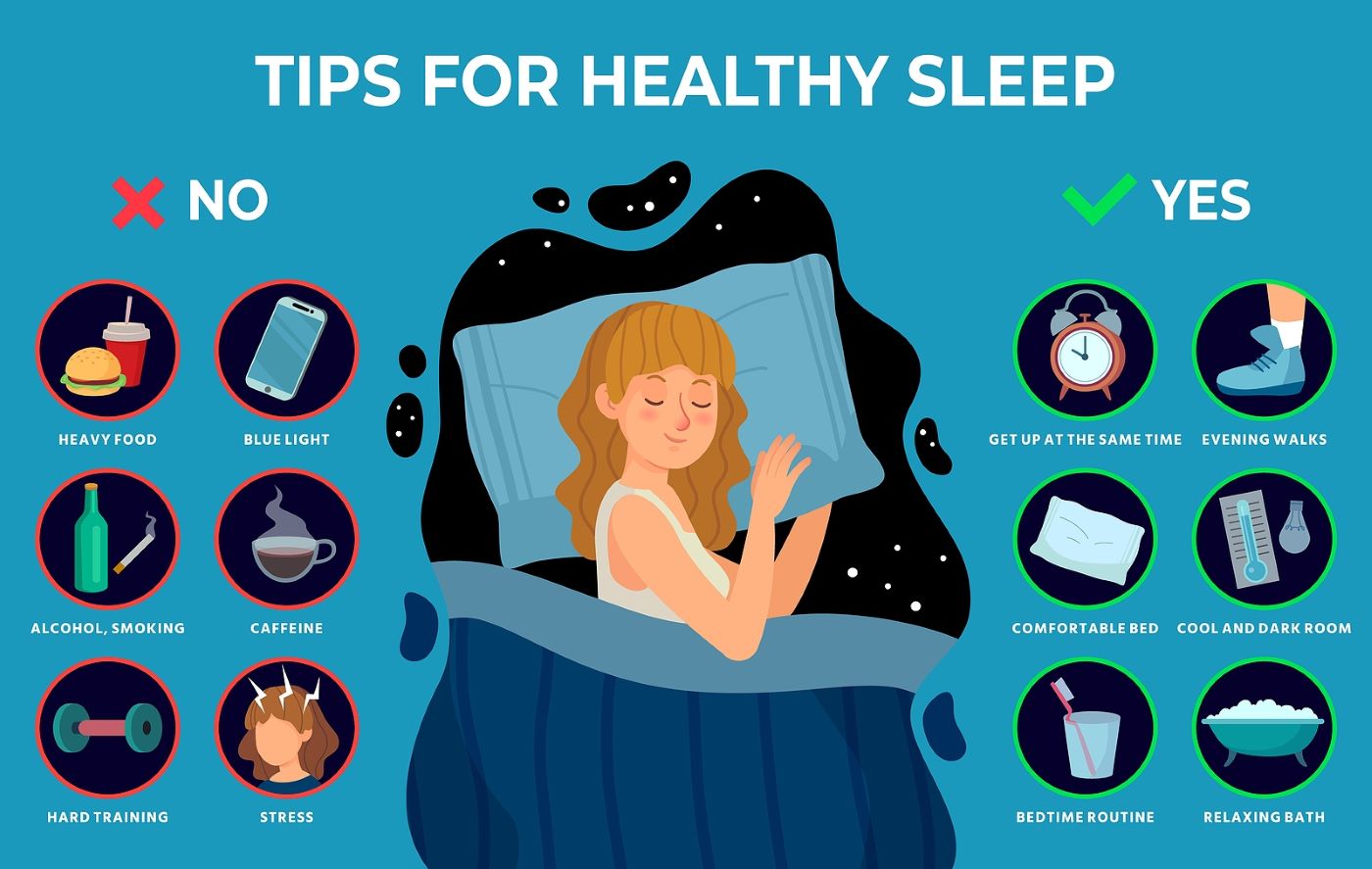To improve sleep and recovery, maintain a regular sleep schedule and create a restful environment. Avoid caffeine and electronics before bedtime to enhance sleep quality.
Achieving restorative sleep is pivotal for overall health and effective daily functioning. Our bodies need adequate rest to repair tissues, consolidate memories, and rejuvenate both mentally and physically. With the chaos of modern life, many people struggle to find a peaceful night's sleep, directly affecting their well-being and recovery processes.
Here, we'll provide actionable tips that are grounded in scientific research and expert advice to guide you toward a better night's rest. These strategies are designed not just to increase the quantity of your sleep, but to significantly improve its quality, which is crucial for optimal recovery and performance in all aspects of life. Embracing these sleep-enhancing practices can lead to profound improvements in energy levels, mood, and overall health.
The Impact Of Sleep On Wellbeing
Understanding the impact of sleep on well-being can transform your life. Good sleep boosts your mood, sharpens your brain, and strengthens your body. But how does sleep affect your overall health and recovery? Let's dive in and explore this crucial link.
Link Between Sleep And Overall Health
Sleep is the cornerstone of a healthy lifestyle. Think of it as a daily tune-up for your body and mind. Quality sleep can improve heart health, bolster your immune system, and regulate weight. Consistent, restful sleep can make you feel energized, alert, and ready to tackle the day. Ignoring its importance can lead to chronic health problems.
- Boosts Immune Function: Your body fights off sickness better when you sleep well.
- Manages Weight: Good sleep patterns help balance hormones that control appetite.
- Reduces Stress: Sleep helps reduce stress and prepares you to manage challenges.
Effects Of Poor Sleep On Recovery
Recovery slows down when you cut corners on sleep. Your body needs sleep to repair muscles, consolidate memories, and release growth hormones. Poor sleep can make you feel groggy, clouding your thinking and delaying physical recovery.
| Effect of Poor Sleep | Consequence |
|---|---|
| Weakened Immunity | More prone to get sick. |
| Memory Issues | Harder to learn or remember new information. |
| Muscle Recovery | Longer recovery time after physical activity. |
| Mood Swings | Impacts emotional well-being. |
Prioritize your sleep to stay healthy. A booming health depends on a good night's rest. Your body will thank you with better performance, sharper focus, and a happier mood.

Credit: mymind.org
Cultivating An Ideal Sleep Environment
Your sleep quality can greatly improve with the right environment. A serene, comfy room is key for rest. Let's make your bedroom a sleep sanctuary.
Elements Of A Restful Bedroom
A restful bedroom nurtures sleep in many ways.
- Calming colors: Choose soothing tones for walls and bedding.
- Minimal clutter: A tidy space lets your mind relax.
- Quality mattresses and pillows: Invest in comfort for your body.
Importance Of Darkness And Silence
Dark, quiet rooms signal your brain to rest. Use blackout curtains to block light. Try earplugs or white noise machines to mute sounds.
Solution |
Benefit |
|---|---|
Blackout Curtains |
Mimics natural night for your sleep cycle. |
Earplugs/White Noise |
Distracting noises won't disturb you. |
Temperature And Comfort Considerations
Your bedroom temp affects your sleep. Aim for 65-70°F (18-21°C).
Layer bedding for personal comfort. Breathe comfortably with the right pajamas.
- Breathable fabrics: Cotton or bamboo keeps you cool.
- Flexible bedding: Use layers to adjust easily.
Establishing A Pre-sleep Routine
Establishing a Pre-Sleep Routine can be transformational for your sleep quality and overall recovery. Picture this: your body and mind ease into a state of readiness for sleep, paving the way for a tranquil night. To make this a reality, nurturing certain habits before bedtime is pivotal. Let's delve into the key components of a beneficial pre-sleep ritual.
Relaxing Activities To Wind Down
A calm mind promotes a restful slumber. Engaging in relaxing activities helps signal your body that it's time to slow down. Consider these options:
- Reading a book: A chapter from a calming genre can work wonders.
- Listening to soft music: Melodies can soothe the mind and relieve stress.
- Stretching or yoga: Gentle movements ease physical tension.
- Meditation: Mindfulness practices encourage mental clarity.
The Role Of Screen Time And Electronics
Electronic devices emit blue light, which can disrupt your body's natural sleep-wake cycle. Minimizing screen time before bed is crucial:
| Device | Time to Avoid Before Sleep |
|---|---|
| Smartphones | 1 hour |
| Computers | 1 hour |
| Televisions | 1 hour |
Consider switching to ‘night mode’ on devices if use is necessary.
Pre-sleep Nutrition And Beverage Choices
What you consume before bed can influence sleep quality. Aim for:
- Light snacks: Almonds or a small bowl of oatmeal can be ideal.
- Warm milk: A time-tested sleep inducer.
- Herbal tea: Options like chamomile are great for relaxation.
Avoid caffeine and heavy meals close to bedtime to prevent sleep disturbances.
Mastering Your Sleep Schedule
Good quality sleep is essential for recovery and overall health. An unpredictable sleep schedule can disrupt your body's natural rhythm. Mastering your sleep schedule is key for better sleep and recovery. It will help you wake up refreshed and maintain your well-being. Let’s dive into how you can achieve this goal.
Consistency With Sleep And Wake Times
Make sleep a priority by setting a fixed bedtime and wake-up time. Stick to these times every day, even on weekends. This regularity strengthens your body's sleep-wake cycle, making it easier to fall asleep and wake up naturally.
- Choose a bedtime when you usually feel tired, so that you don't toss and turn.
- Avoid sleeping in even after a late night to keep your cycle consistent.
Understanding Your Body's Sleep Needs
Individual sleep needs vary, but adults typically require 7-9 hours of sleep per night. Pay attention to how you feel to determine your optimal sleep duration. Are you energetic and productive on seven hours, or do you need an extra hour?
Age Group |
Recommended Sleep |
|---|---|
Adults |
7-9 Hours |
Teens |
8-10 Hours |
Adjust your bedtime to accomplish your sleep needs while awakening at the same hour daily.
Managing Sleep Variations On Weekends
Weekends may tempt you to stay up late and sleep in. This can disrupt your sleep schedule.
Try the following to keep your sleep schedule on track:
- Set firm limits for how late you stay up and sleep in.
- Use light to regulate your biological clock. Expose yourself to sunlight in the morning and avoid bright light in the evening.
- Create a relaxing pre-sleep routine to wind down before bedtime.
This balance allows you to enjoy your weekend without sacrificing sleep quality.
Adopting Healthy Daytime Habits
Nailing a nighttime routine starts with how you spend your day. The right daytime practices set the stage for quality slumber. Let's dive into habits that pave the way for restorative sleep.
Exercise And Physical Activity For Better Sleep
Moving your body does wonders for nighttime rest. Regular exercise boosts sleep quality and duration. But timing is key—energetic workouts too close to bedtime might disrupt sleep. Try to sweat it out earlier for the best results.
- Yoga or stretching in the morning
- A midday walk
- High-intensity workouts before the evening
Nutrition's Impact On Sleep Quality
Your food choices affect how well you sleep. Eat balanced meals to enhance sleep quality. Include these nutrients for a restful night:
Minerals |
Magnesium and potassium help muscles relax. |
|---|---|
Carbohydrates |
Whole grains promote tryptophan release. |
Caffeine And Alcohol: Their Effect On Sleep Patterns
Caffeine and alcohol alter sleep cycles. They may impede deep restorative phases of sleep. Limit caffeine by afternoon and alcohol several hours before bed to prevent sleep fragments.
- Avoid coffee after pm
- Limit alcohol intake early evening

Credit: www.sleepfoundation.org
Mindfulness And Relaxation Techniques
Quality sleep serves as a cornerstone for recovery and overall well-being. Incorporating mindfulness and relaxation techniques into your bedtime routine can significantly enhance your sleep quality. These practices promote mental calmness and prepare your body for rest, aiding in a faster transition to deep sleep.
Meditation And Deep Breathing Exercises
Meditation helps you clear your mind and ease tension. Deep breathing exercises work hand-in-hand with meditation to reduce stress. Start with just a few minutes each night:
- Find a comfortable position.
- Close your eyes and focus on your breath.
- Inhale deeply, hold for a moment, and exhale slowly.
- Repeat and let worries fade away with each breath.
Progressive Muscle Relaxation
Progressive Muscle Relaxation (PMR) systematically tenses and releases different muscle groups. This technique reduces physical tension and promotes relaxation. Follow these steps:
- Start at your feet and work upward.
- Tense each muscle group for five seconds.
- Relax for 30 seconds before moving to the next group.
The Use Of Aromatherapy And Essential Oils
Aromatherapy engages your senses to foster relaxation. Essential oils such as lavender, chamomile, and sandalwood are popular for their calming effects. To incorporate these into your routine:
Method |
Instructions |
|---|---|
Diffuser |
Add water and a few drops of oil, then turn on before bedtime. |
Topical Application |
Dilute with a carrier oil and apply to pressure points. |
Inhalation |
Place a few drops on a cloth and inhale deeply. |
When To Seek Professional Help
Struggling to get quality sleep? Despite trying various tips and tricks, some sleep problems persist. Professional help can optimize sleep and aid recovery. This section highlights when expert intervention becomes vital.
Identifying Sleep Disorders
Recognizing persistent sleep issues is crucial. Watch for these signs:
- Difficulty falling or staying asleep
- Feeling tired after a full night's rest
- Frequent awakenings during the night
- Loud snoring or gasping for air
- Daytime fatigue impacting daily life
Benefits Of Consulting A Sleep Specialist
A sleep specialist offers personalized insights. Benefits include:
| Expert Analysis | Customized Plans | Ongoing Support |
|---|---|---|
| Deep-dive into sleep patterns | Strategies tailored to your needs | Guidance for sustained improvement |
Therapies And Treatments For Sleep Disturbances
Various treatments exist. A specialist may suggest:
- Cognitive Behavioral Therapy for Insomnia (CBT-I)
- Prescription sleep medications
- Continuous Positive Airway Pressure (CPAP) therapy
- Lifestyle modifications, such as diet and exercise changes

Credit: www.everydayhealth.com
Frequently Asked Questions Of Tips For Better Sleep And Recovery
1. How To Improve Sleep Quality?
Improving sleep quality can be achieved through a consistent bedtime routine, a comfortable sleep environment, and reducing screen time before bed.
2. Can Diet Affect Sleep Patterns?
Yes, diet plays a significant role in sleep quality; foods high in tryptophan, magnesium, and melatonin can promote better sleep and recovery.
3. What Is The Best Sleep Position?
The best sleep position varies among individuals, but sleeping on your back is widely recognized to support spinal alignment and reduce pain.
Conclusion
Embracing these sleep-improving tactics can transform your night ritual into a gateway to rejuvenation. Prioritize comfort and routine for optimal rest. Allow your body and mind the recovery they deserve. Remember, quality sleep is a pillar of health. Sweet dreams and stellar wakefulness await with these actionable steps.


